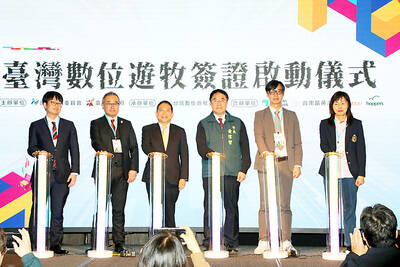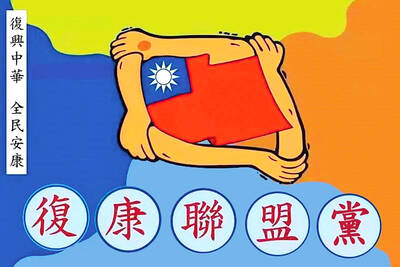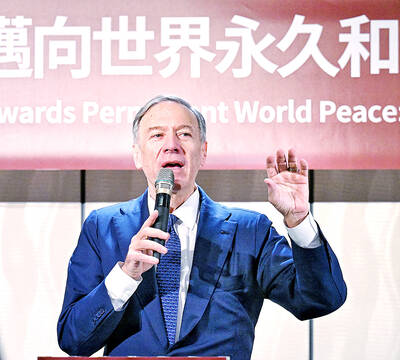Japan’s central bank kept its benchmark rate steady and boosted its purchase of government bonds yesterday to keep ample cash in the monetary system as the country grapples with a debilitating global slowdown.
The Bank of Japan has little room left to go on standard monetary policy, such as lowering interest rates, with its benchmark interest rate already close to zero. Wrapping up a two-day meeting, the bank’s board voted unanimously to keep its key overnight call rate at 0.1 percent.
That compares with the US’ targeted range of between zero and 0.25 percent and the eurozone’s 1.5 percent.
The Bank of Japan also raised its monthly government bond purchase to ¥1.8 trillion (US$18.3 billion) from the previous ¥1.4 trillion, effective this month.
Late on Tuesday, the bank decided on an unusual move to explore a framework to provide loans to commercial banks in an effort to shore up their capital base.
That in turn is expected to encourage commercial banks to lend more freely to businesses. Fears are growing about businesses that are struggling because of tightening credit amid the deepening downturn.
“The options left for what the Bank of Japan can do are limited, and so it has decided to carry out what it can do,” said Yasuo Yamamoto, economist at Mizuho Research Institute in Tokyo.
Still, the measures are expected to achieve little direct results, although they could help boost a sense of confidence in Japan’ banks, while buying more long-term government bonds will keep interest rates down, he said.
The central bank acknowledged the capital strength of Japanese financial institutions may be hurt by the prolonged slump in the world’s second-largest economy as well as massive losses on securities.
The Tokyo stock market tumbled since the global financial crisis surfaced last year, although shares have recovered somewhat in recent sessions, partly on hopes of market-bolstering moves from the Bank of Japan.
The bank expressed deep concerns about the economy, battered by declining exports and weakening domestic demand as corporate profit drops and unemployment rises.
“Under these circumstances, economic conditions have deteriorated significantly and are likely to continue deteriorating for the time being,” it said in a statement.
But it said it expects the Japanese economy to start recovering by the latter half of the current year, which runs through next March.
The central bank already buys commercial paper, corporate bonds and stocks from financial institutions to help shore up their balance sheets.

QUIET START: Nearly a week after applications opened, agencies did not announce or promote the program, nor did they explain how it differed from other visitor visas Taiwan has launched a six-month “digital nomad visitor visa” program for foreign nationals from its list of visa-exempt countries who meet financial eligibility criteria and provide proof of work contracts. To apply, foreign nationals must either provide proof that they have obtained a digital nomad visa issued by another country or demonstrate earnings based on age brackets, the Bureau of Consular Affairs said. Applicants aged 20 to 29 must show they earned an annual salary of at least US$20,000 or its equivalent in one of the past two years, while those aged 30 or older must provide proof they earned US$40,000 in

SERIOUS ALLEGATIONS: The suspects formed spy networks and paramilitary groups to kill government officials during a possible Chinese invasion, prosecutors said Prosecutors have indicted seven retired military officers, members of the Rehabilitation Alliance Party, for allegedly obtaining funds from China, and forming paramilitary groups and assassination squads in Taiwan to collaborate with Chinese troops in a possible war. The suspects contravened the National Security Act (國家安全法) by taking photos and drawing maps of key radar stations, missile installations and the American Institute in Taiwan’s headquarters in Taipei, prosecutors said. They allegedly prepared to collaborate with China during a possible invasion of Taiwan, prosecutors said. Retired military officer Chu Hung-i (屈宏義), 62, a Republic of China Army Academy graduate, went to China

AIR DEFENSE: The Norwegian missile system has proved highly effective in Ukraine in its war against Russia, and the US has recommended it for Taiwan, an expert said The Norwegian Advanced Surface-to-Air Missile Systems (NASAMS) Taiwan ordered from the US would be installed in strategically important positions in Taipei and New Taipei City to guard the region, the Ministry of National Defense said in statement yesterday. The air defense system would be deployed in Taipei’s Songshan District (松山) and New Taipei City’s Tamsui District (淡水), the ministry said, adding that the systems could be delivered as soon as the end of this year. The US Defense Security Cooperation Agency has previously said that three NASAMS would be sold to Taiwan. The weapons are part of the 17th US arms sale to

UNITY MESSAGE: Rather than focusing on what Trump said on the campaign trail about Taiwan, Taipei should be willing to engage with the US, Pompeo said Taiwan plays a key role in Washington’s model of deterrence against China, former US secretary of state Mike Pompeo said in a speech in Taipei yesterday. During US president-elect Donald Trump’s first term, “we had developed what we believe was a pretty effective model of deterrence against adversaries who wanted to undermine the set of rules and values that the people of Taiwan and the people of the US hold dear,” Pompeo said at a forum organized by the Formosa Republican Association. “Succeeding in continuing to build this model will not solely rest at the feet of president Trump and his team,